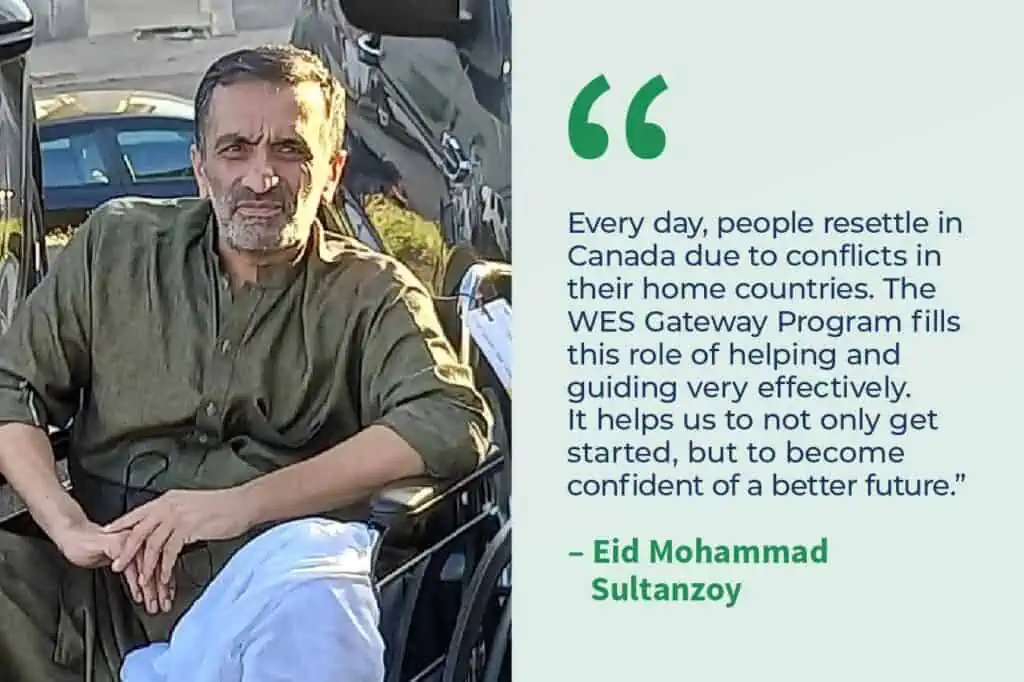How One Non-Profit Champions the Voices of Refugees
On World Refugee Day, the United Nations High Commissioner for Refugees (UNHCR) calls on us to “champion [the right of refugees] to seek safety, build support for their economic and social inclusion, and advocate for solutions to their plight.”
We recently sat down with Chris Khoury and Cheri Chan from Voice of Refugees, a referral partner of the WES Gateway Program, to discuss their work and experience supporting refugee resettlement. This blog post recounts highlights from that rich conversation.
Centering VOR’s Work on Refugee Experiences
A Palestinian refugee, and the child and grandchild of Palestinian refugees, Chris Khoury grew up in Lebanon in what he describes as a 30-year limbo. As a Palestinian refugee there, he held no recognized citizenship, the lack of which prevented him from enjoying a sense of belonging or seeing a clear future for himself. Despite these barriers, Chris completed a degree in business administration and found work in accounting for a non-profit. When he learned through a close friend about an organization working with refugees, Chris was inspired by the clients’ experiences and dedicated five years to advocating refugee rights and policy changes. Chris eventually sought asylum in the United States, driven by a “glimpse of hope for a pathway to citizenship.” He explains that working with refugees is not only a passion—“It’s more of a mission and it’s part of my identity to help refugees because I am a refugee and I’ve been struggling all my life with statelessness.”
Chris is executive director at Voice of Refugees (VOR), a multi-service agency based in Anaheim, California, supporting refugees as they resettle in Orange County and neighboring counties in Southern California. Through an array of programs and services, VOR addresses some of the most pressing issues for refugees in the U.S., including English language learning, transportation, and employment. VOR supported Chris when he resettled in the U.S. in 2018, and he remained involved with the organization as a volunteer until becoming its executive director. In this role, Chris taps his own lived experience to inform his approach to leading an organization that engages local volunteers born in the U.S. and abroad.
Working in an organization that provides direct support to refugees in the U.S., Chris reflects on the disconnect between macro-level conversations about systemic solutions to resettlement, and the urgency of providing frontline support. He highlights the importance of committing to long-term assistance, developing relationships, and fostering community—keeping the focus on each unique human experience at the forefront of the work.
This principle lies at the heart of VOR’s mission.
For Chris, the identity of being a refugee is complex.
“Some people are afraid of what the word ‘refugee’ represents. For some refugees, it is a humiliating word […] It is important to understand that no one chooses to be a refugee. A refugee is someone who’s uprooted from their home country and put in a different place where they must restart their lives.” — Chris
Cheri Chan, office manager at VOR, adds, “Being a refugee means being courageous and resilient. It is a sacrifice. There is a deep sense of despair when a person is forced to flee one’s homeland. At the same time, there is also an equal or greater measure of hope that keeps them from giving up. Sometimes [a refugee] waits 10-15 years in a secondary country just for a chance to have a better future.”
Cheri came to the U.S. as an international student from Hong Kong and developed a career in academic research, as well as supporting international students and global community-building in private universities in the U.S. Like Chris, she volunteered with VOR before joining the staff.
A Search for Belonging
In its work with refugees, VOR prioritizes “care management”—that is, fostering caring relationships in its services and programs. “I feel most alive when I get to witness the birth of a true community […] one that is really marked by love and respect, dignity and joy. At VOR, refugees and volunteers take steps alongside each other. They develop a supportive and mutually caring friendship,” Cheri explains.
The presence of community is palpable to anyone collaborating with VOR. Isabel Schroeder, program manager at WES Global Talent Bridge and for the WES Gateway Program in the U.S., recalls the dynamics she witnessed during her recent site visit in Anaheim.“For displaced individuals it may take a long time until they feel that they belong in the resettlement country or their local community— California, New York, or Anaheim in this case—but finding belonging in the VOR community becomes an initial anchor.”

The care management approach allows VOR to offer comprehensive services that align with the needs of specific populations as refugees navigate different U.S. systems. VOR recognizes the impact that long-term support and solidarity can have to empower refugees, and the need for all of society to play a role in refugee inclusion and belonging .
Removing Barriers to Employment
As persecution, conflict, and natural disasters lead to an increase in the number of forcibly displaced people in the U.S. and around the world, the need for strong systems of support and continued policy advocacy efforts that promote inclusion is critical. Systemic change is necessary—and action at the local level is crucial. Each individual has the potential to make a meaningful and lasting impact on the refugee resettlement experience.
“I would like to see employers being more open to consider experiences outside the U.S. and invite applicants to an interview when they see résumés with foreign degrees. Give refugees a chance to prove themselves at the interview. We’ve known highly qualified, highly educated, highly reliable young adults who never got a response from any employer (including many fast-food chains in their cities) for six months, despite diligently submitting dozens of applications. After finally being employed, it’s clear that they often become immediate assets to the team and are well liked by supervisors and co-workers.” — Cheri
The economic contributions of refugees exceed any benefits they may receive. Furthermore, refugees and immigrants constitute an increasingly significant portion of the workforce in most advanced economies. In recent years, labor shortages across the U.S. have become a significant issue for local economies, resulting in a steady increase in demand for immigrant talent. The involvement of immigrants in the workforce is crucial in tackling labor shortages as immigrants play a vital role in many sectors such as health care, agriculture, and logistics. Refugees and immigrants make up 17 percent of the U.S. labor force, and nearly half of recently arrived refugees and immigrants hold a bachelor’s degree or higher.
Yet skill underutilization among refugees and immigrants is widespread. According to the Migration Policy Institute (MPI), more than two million immigrants and refugees with college degrees are unemployed or underemployed in the U.S. Sixty percent hold credentials earned abroad. “We’ve known fathers with professional or graduate degrees who served with U.S. projects in Afghanistan and considered it an honor to do so, only to find their experiences overlooked and dismissed here on American soil,” Cheri explains. Many forcibly displaced persons who resettle in the U.S. have to take survival jobs to support their families even though they are overqualified for those positions.
“It’s very disorienting to these individuals who are trying to heal from trauma. There is trauma not just from being on an evacuation plane, but even more in the daily loss of dignity when they are eager to lay down strong roots in new soil but find themselves systemically planted in poverty and helplessness.” — Cheri
Creating workforce opportunities for refugees and immigrants is imperative to ensure economic mobility and thriving communities.
Creating pathways for displaced individuals to pursue careers that build on their education and experience from abroad as they resettle in the U.S. is essential to ensure access to equitable and fulfilling opportunities. The VOR community sees firsthand the impact of supporting displaced people during their resettlement—clients like a Syrian pediatrician exploring alternative careers in health care, Iraqi youth continuing their post-secondary education, dentists with experience in Iraq and Afghanistan seeking to practice in the U.S. “When you do this, you bring support and encouragement to the whole family in their long journey of resettlement in [the U.S.]. You help them reach home, at last,” Cheri says.
Chris and Cheri emphasize the importance of raising awareness about issues affecting refugees, understanding the refugee resettlement process in the U.S., and exploring ways to become involved and support refugees on this journey. Chris encourages individuals to seize the next available opportunity, even if it begins with a short-term volunteer commitment such as delivering food to a refugee family for a day. At the same time, both Chris and Cheri highlight the need to amplify the voices of refugees, championing their rights and well-being. Direct support and advocacy together can make progress toward a world with compassion for all who seek refuge.




